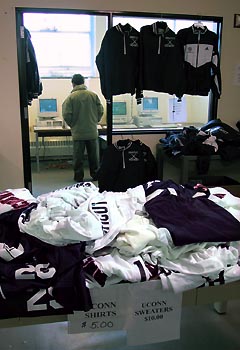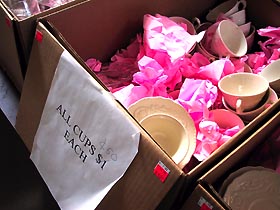|
This is an archived article.
For the latest news, go to the
Advance Homepage
For more archives, go to the Advance Archive/Search Page. | |||
|
Surplus Store Sales A Creative
Approach To 'Unwanted' Goods By Richard Veilleux Wayne Landry and Bob Kaufman have a lot in common. Like Kaufman, a UConn alum and CEO of Bob's Discount Furniture, Landry wants his merchandise to sell. Like Kaufman, if an item doesn't sell right away, Landry cuts prices until they do. And, like Kaufman, Landry will not be undersold. Kaufman, of course, sells new furniture. The merchandise peddled by Landry, central stores manager at UConn, however, started life long before it ended up on his "showroom" floor in space on the Depot Campus formerly occupied by Mail Services. Still, used or new, it's hard to quibble about Landry's prices.
A stack of almost new Swintec electric typewriters were selling for $3 each on Nov. 15, the most recent day the store was open. A shelf full of new, albeit small, soccer cleats sold for $12 a pair. In a space off to one side of the store, a bank of Hewlett Packard computers, complete with tower, monitor, and keyboard, topped out at $80. UConn's longest running tag sale has now operated for 15 months, saving tons of chairs, desks, filing cabinets, shelving units, computers, and athletic clothes from clogging up the nation's landfills. For a while, at least. The Surplus Store also has earned the University a cool $50,000 during that time, not counting the money saved in shipping costs that would have been accrued, had the previously owned office equipment been trucked to those landfills. "It's really a win-win situation," says Sharon Alexander, director of procurement and logistical services (formerly known as purchasing) who, together with Dale Dreyfuss, vice chancellor for business administration, and Landry decided to open the store. "With UConn 2000, we're inundated with surplus property, as new buildings open and people receive new furniture and equipment. The items being surplused were not being tagged (claimed by other departments) fast enough for us to get rid of them." The surplus store's supply chain is a familiar one to veteran UConn employees. Office equipment is surplused by departments and taken to the old Central Warehouse or the building on the Depot Campus. Employees are welcome to visit surplus during regular business hours and pick out - "tag" - discarded furniture or other items for use in their office. Materials not taken after a specified period of time - usually a month or two - go to the store, which is open to the public once a month. The next sale date is Dec. 13, just in time for Christmas. And there are items suitable for giving. Landry recently sold a set of new truck tires at a fraction of their original cost. There are several boxes of plates, cups, and saucers. Nearly every month, the sale features a stock of athletic clothing, some new and some used, usually contributed by the soccer and field hockey teams. The computers, while old, all work and have a Pentium I or Pentium II processor, a two- or three-gigabyte hard drive, and at least 166-200 megahertz. Sometimes, the bizarre is intermingled with the commonplace. In November, a huge, rather old bus engine occupied a corner of the loading dock. A bus transmission rested nearby. Just inside the door, an industrial-strength - and industrial-sized - drill press, courtesy of the Institute of Materials Science, loomed over a few small desks. A hospital guerney sold earlier this year. Five or six office copy machines - Ricoh, Canon, and Konica - hummed, ready to be tested. Ranging from $150-$300, the machines were a bargain. Proceeds from the sales are used to offset the cost to ship scrap computers and other electronic equipment to a federal prison in New Jersey, where inmates break them down, remove intact parts, and recycle broken or unusable parts. The remainder of the proceeds are deposited in an account that funds small capital or equipment projects, says Dreyfuss. "It's an excellent program," says Alexander. "Community members can purchase some interesting items for a nominal fee, and it gives the University another avenue to get rid of our surplus stock." |


